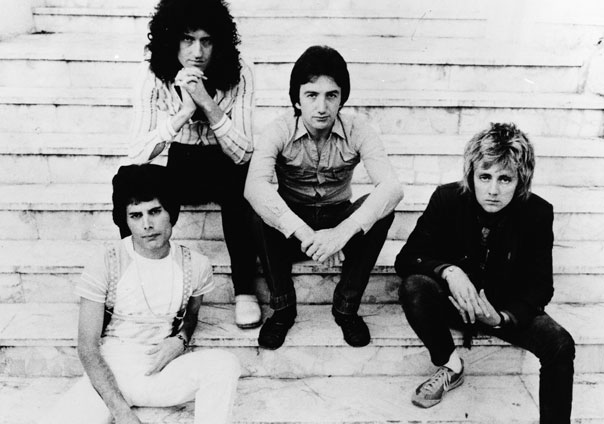After the mammoth success of “Bohemian Rhapsody”, the hits came thick and fast. The 1975 album A Night At The Opera stayed in the UK charts for more than a year. The following year’s A Day At The Races went over huge in Japan, and in Britain all four Queen albums had simultaneously taken up residency in the charts.
Love Queen or loathe them, A Night At The Opera and A Day At The Races were masterpieces of their kind. Nobody before or since has done pomp and bombast with more exuberance and joie de vivre. This was indeed rock’n’roll as choreographed by Cecil B DeMille. The former was at the time the most expensive rock album ever made. Recorded and mixed in six different studios, it stretched the technology of the time to its limits. “Bohemian Rhapsody” itself took three weeks to record, and there were more vocal overdubs than it was possible to fit on the tape at certain points. A Day At The Races was the first album to be produced by the band. But the absence of Roy Thomas Baker is hardly discernible, so fully had Mercury and May in particular absorbed the technique Baker himself described as “kitchen sink over-production.”
With the double-A single “We Will Rock You”/“We Are The Champions” spending six months on the US chart and giving them their first Top Five hit, their 1977 album News Of The World made them superstars in the States.
“As soon as we made it,” Mercury said, “we knew there were no longer any limits on what we could do.”
By now, of course, punk had exploded all over the face of popular music. It made little difference to Queen’s popularity but it did appear to persuade them to tone down some of their more grandiose tendencies. News Of The World boasted shorter songs and a more straightforward rock direction. But the band’s main contribution to punk was unwittingly to facilitate the legendary Sex Pistols/Bill Grundy debacle. Queen had originally been scheduled to appear on the programme, but pulled out at the last minute. Left with a slot to fill at short notice, EMI nominated Queen’s newest labelmates to swear themselves into TV history.
Meanwhile, the band embraced success and excess. In 1979, to mark Mercury’s birthday, more than 100 friends were flown in on Concorde for a party in a New York hotel. “Don’t worry about the costs, dears,” he said. “The only thing you’ll have to pay for are the condoms.” Supplemented by regulars from the area’s gay clubs, along with an assortment of deviants, there ensued a five-day orgy. Highlights included a trio of auto-fellating transsexuals and a group of ladies who performed a variety of sexual acts with snakes.
Nothing compared to the rampant hedonism that was life on the road for Queen. “Led Zeppelin set the benchmark for rock’n’roll touring excess,” confides a former road manager. “But Queen took it up a number of notches. Their excess was organised like a military manoeuvre. The drugs were flown in to whatever city they were playing. If the coke didn’t arrive on time, the show would be delayed. The sex was always on a plate. Half the fun of touring with any band is sitting down at breakfast the morning after a show and hearing what the musicians had got up to the previous night. Roger Taylor had the reputation of being a complete rock slut. Every morning there’d be a story going round about him that would make you drop your knife and fork. Then someone would stroll in and spill the beans on what Freddie had got up to and that would make you fall off your chair. Around ’78/’79, when Queen became huge, Freddie’s appetites soared. He was non-stop sex and drugs. Before a show, after a show… even between songs. Before an encore, he’d nip backstage, have a few lines of coke, get a quick blow-job from some bloke he’d just met, then run back to the stage and finish the gig. The man had stamina.”
In autumn 1980 came “Crazy Little Thing Called Love” (reputedly written by Mercury in his bath at the Berlin Hilton) and “Another One Bites The Dust” from the album The Game, providing Queen with their first US No 1s. Mercury settled in New York, purchasing a luxury apartment overlooking Central Park. The big disease with the little name had yet to cast its terrible shadow and NY’s gay community was enjoying a golden age of promiscuity. As Mercury put it: “New York is Sin City and here I am free to slut myself to the hilt. I get up in the morning, scratch my head and wonder who I’m going to fuck next.”
In his 1998 memoir Freddie Mercury, Freestone describes Mercury’s average day between 1980 and 1982. He’d rise around 4pm and rid his apartment of the previous night’s conquests – often as many as six. After breakfast, he’d hand a shopping list to Freestone, who would head off to the drug dealer. Around 8pm, a limo would pick up Mercury and his entourage and drop them at a club, where they’d join hundreds of others in a non-stop fuck-a-thon.
According to Elton John, Freddie partied harder than anyone he ever met. “We’d be up for nights,” he told Uncut in 2001, “sitting there at 11 in the morning, still flying high. Queen were supposed to be catching a plane and Freddie would be like, ‘Oh fuck, another line, dear?’ His appetites were unquenchable. He could out-party me, which is saying something.”



